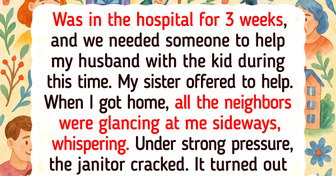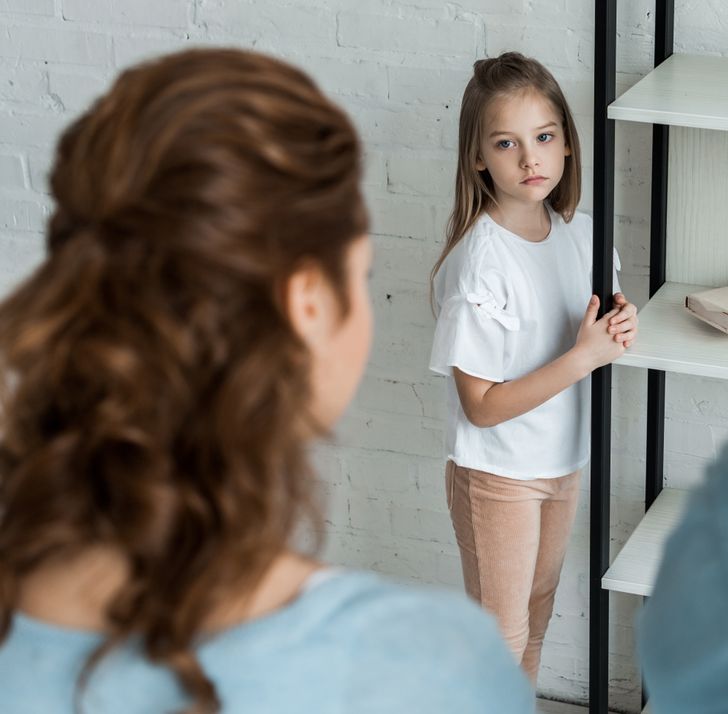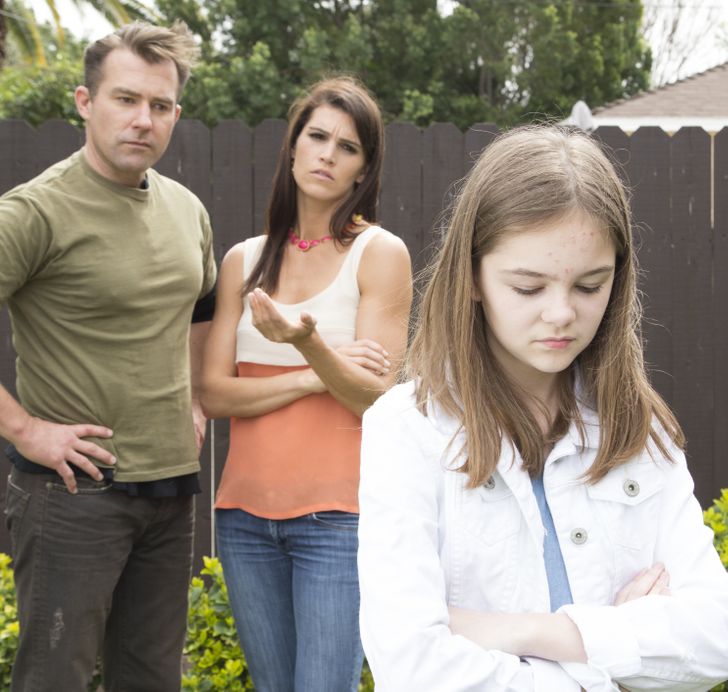Always try to use positive language especially dealing with kids. Also ask yourself about the way you were treated and how it made you feel. But most of all try to talk TO your child not AT them, ask what they think and make the time to focus and listen when they're trying to tell you something that they think is important, Don't dismiss them.
9 Phrases Parents Should Remove From Their Vocabulary to Avoid Harming Their Child
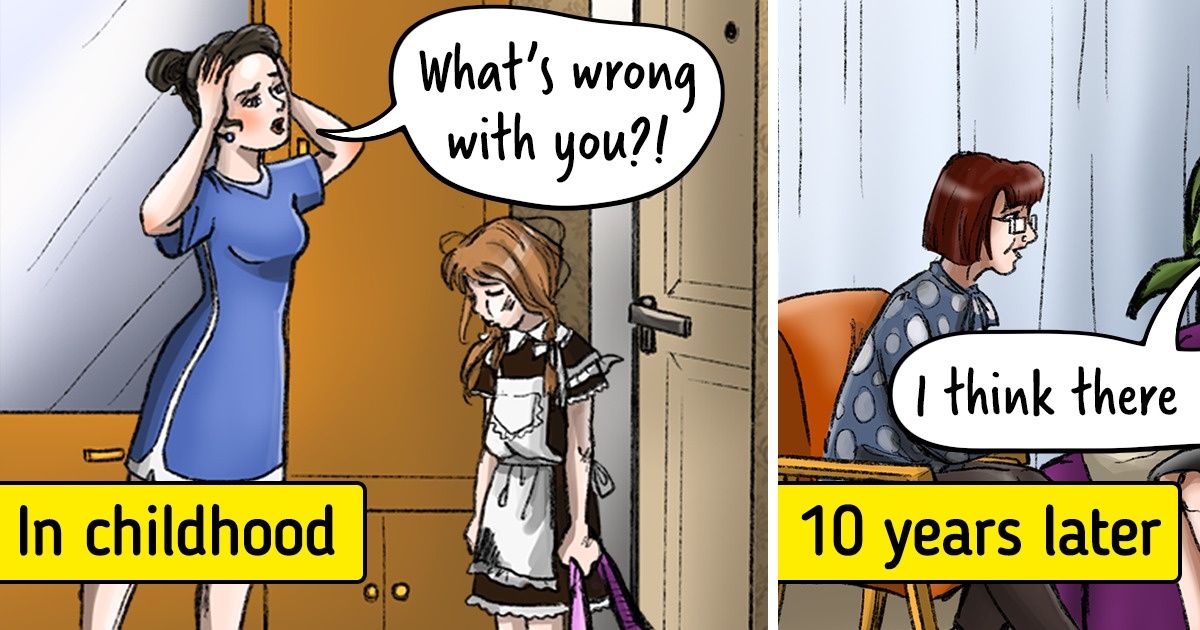
Careless words can even affect adults negatively, let alone children. After all, they are just starting to understand this world, they don’t know how to filter the information they receive, and they practically accept everything on faith. Nevertheless, no parent is immune to mistakes. As a result, dubious educational phrases are passed from generation to generation, which imperceptibly, but steadily affect the psyche of children in a disparaging way.
At Bright Side, we decided to analyze the most common phrases that should be avoided in order to allow your children to grow into happy, healthy, and confident adults.
“I don’t believe you.”
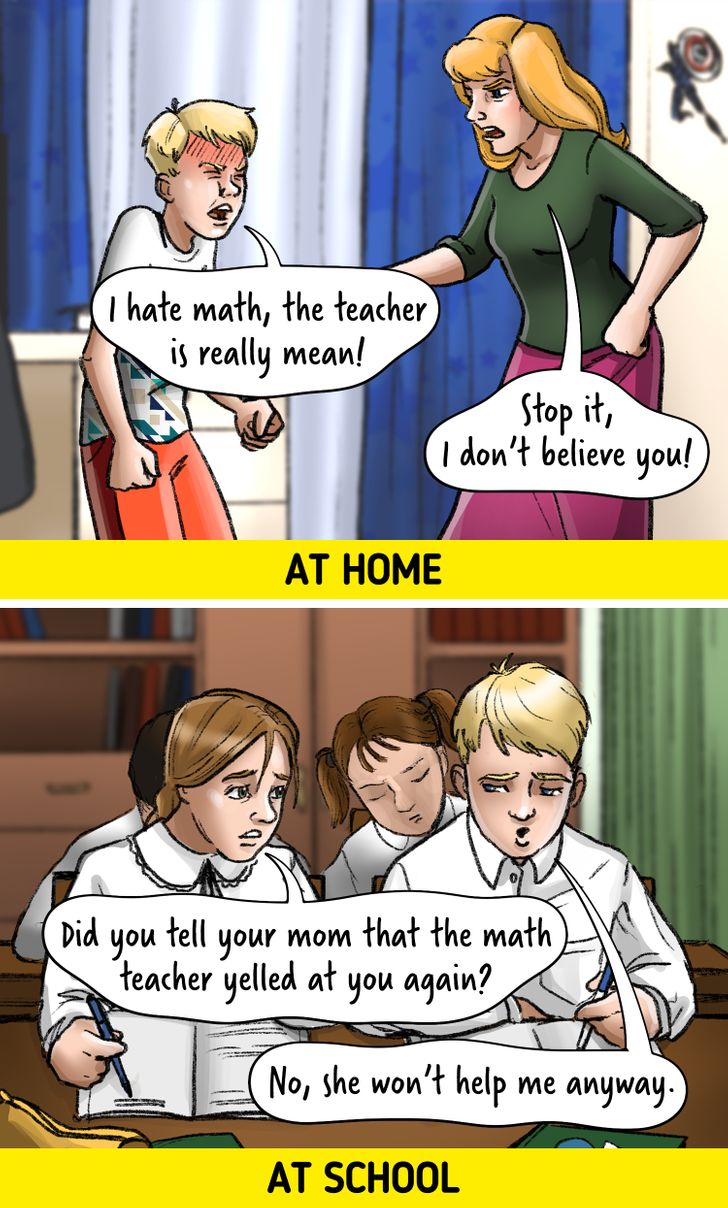
Parents are generally interested in establishing an open line of communication with their children. After all, this is the easiest way to be in the know of all the events of the child’s life and to protect the child from problems when they arise. If this is what you’re interested in, first of all, it’s very important to pay attention to your child’s words and treat their desire to open up in a respectful way.
By saying something like, “You’re lying” or “I don’t believe you,” parents can severely damage their relationship with their children. As a result, the child could stop trusting you and quickly learn to be secretive, and when they need help, they will no longer turn to you for advice.
“I’m leaving this home and never coming back.”
Threats of any kind are clearly not the most friendly way of communication, and they don’t contribute to the calm resolution of a conflict. If your child is arguing with you or showing emotions too vividly, this is already the sign that they’re stressed. The phrases like, “You’ll get in serious trouble” or “I will leave this home, and you won’t see me again,” only increase their nervous tension, and make the child feel unsafe at home.
If the fight lasts longer than you expected and you no longer have enough strength to say anything constructive, instead of threats, it’s better to invite everyone to calm down and end the conversation later.
“You’ll never change.”
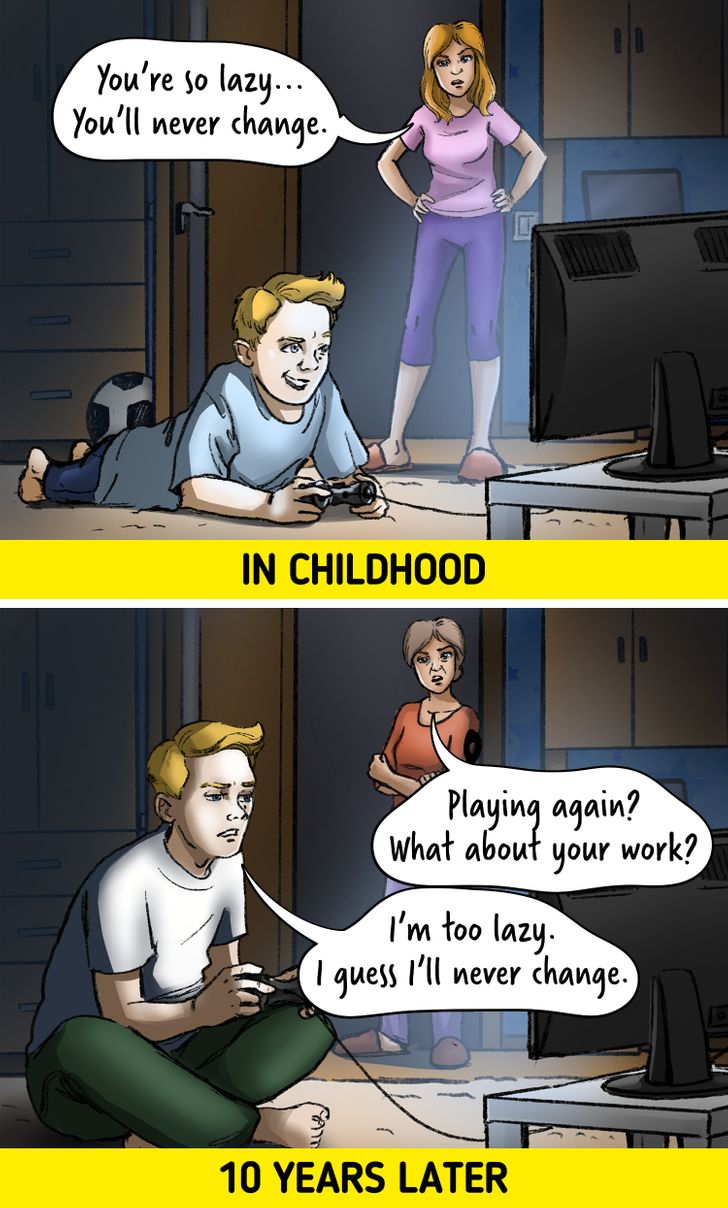
In general, experts recommend avoiding words like, “always” or “never.” Using words like this makes children intuitively feel hopeless. Accusations like, “You always do everything wrong” or “You will never change” automatically place the child in a rigid, and most importantly, negative psychological framework, from which they may not be able to find the strength to get out.
As a result, these phrases, which are often said unconsciously in order to encourage your child to make positive changes. However, the opposite can happen and lead to the persistence of undesirable behavior, which no parent would want.
“Because I said so.”
This is probably one of the most cliché parenting phrases. However, it can hardly be called constructive. The fact is that first, this phrase makes children realize that their feelings are not important, and second, it doesn’t allow them to learn the context and understand the situation, which is very important to know for later life.
For example, your children are begging you to go to the playground, but you need to do the laundry and wash the dishes. If you don’t explain the situation and just say no, you will look like a mean person who doesn’t want them to have fun. If you explain the situation, the children will at least understand that this is not just your whim, even if they get upset anyway.
“You should already know this yourself.”
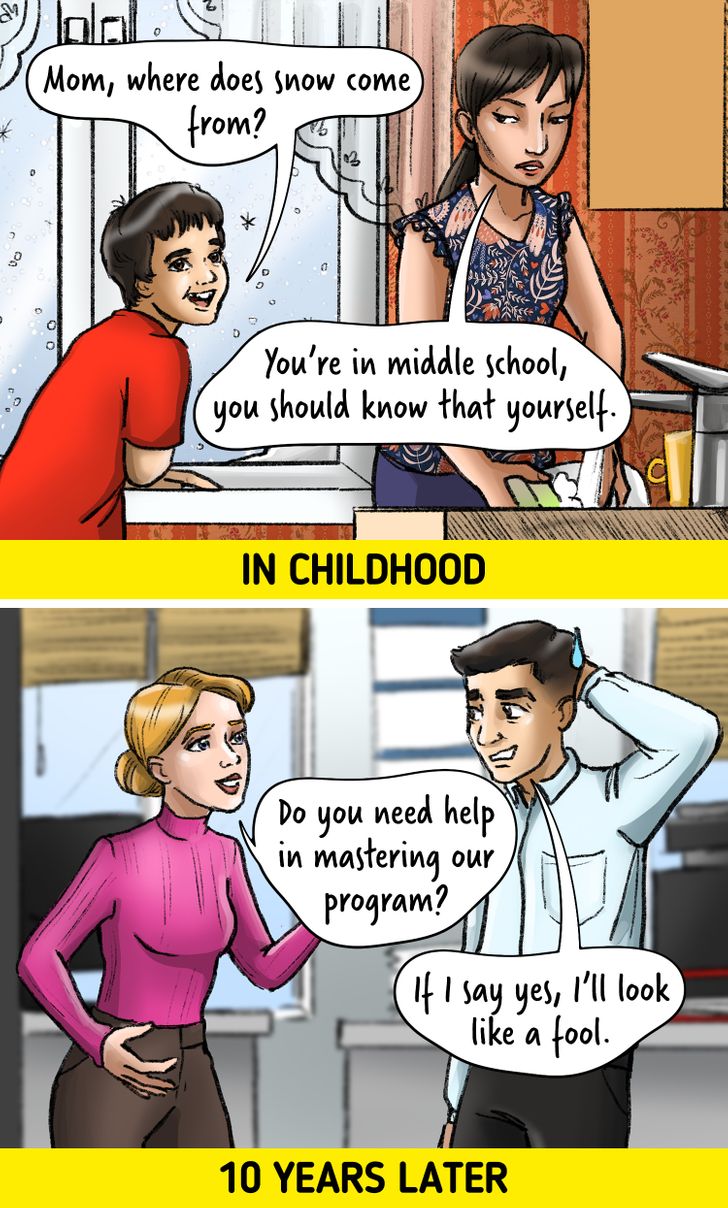
Calling your child stupid or something similar is wrong for a few reasons. First, even little children know that this is an extremely disgraceful and even humiliating word. Second, hearing this from an adult and an experienced person who you also love is doubly painful because the adult probably knows what they are talking about. As a result, there is a risk that the child will take these words too seriously which can lead to many insecurities in the future.
“Are you sure you can do that?”
Parents who are prone to overprotection tend to ask for clarification, demonstrate doubt, and insist on providing help. By trying to do everything for their children, or even discouraging them from doing some things at all, parents believe that they are protecting them from danger and disappointment. However, children perceive this in a negative way, namely, your lack of confidence in their abilities and talents. Ultimately, this can lead to insecurities and fears of taking responsibility for anything important.
“If you eat your soup, you can have dessert.”
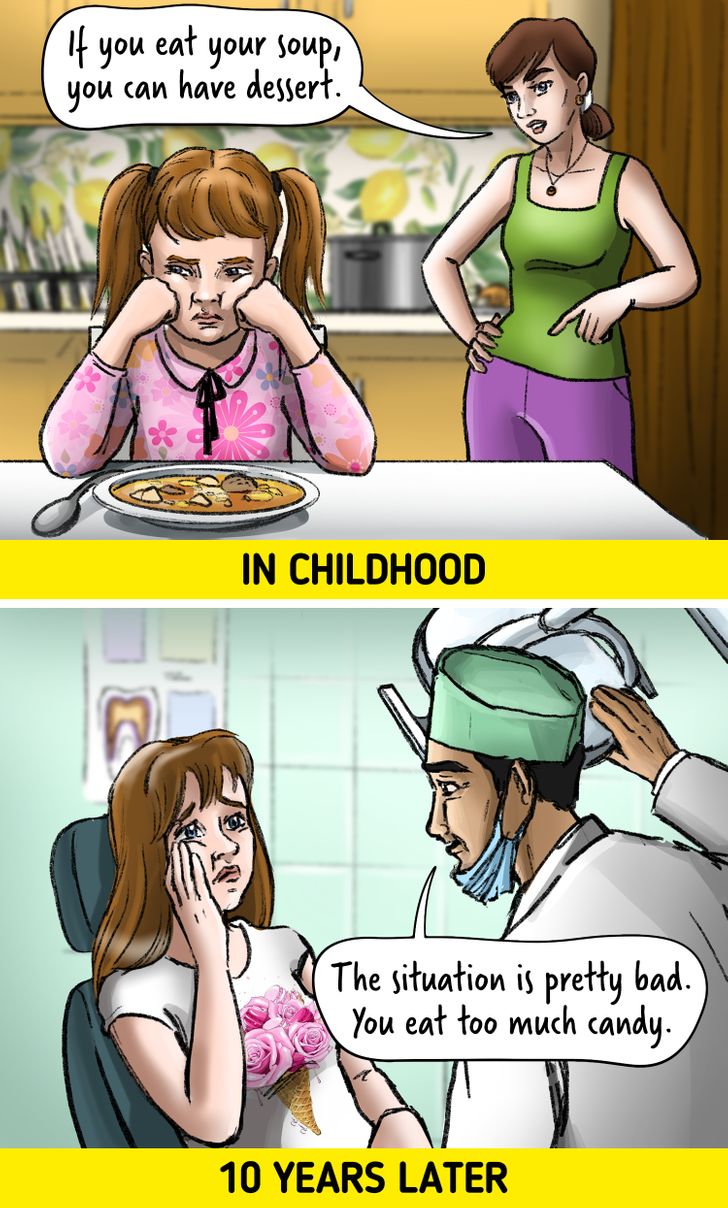
What makes this phrase dangerous is that it makes a child believe that the rest of the food is not as tasty as dessert. Eventually, the child begins to feel less satisfied with their meal which they’re literally forced to eat, even if they had no problems with it before.
If you don’t want your child to develop bad eating habits, don’t use dessert as a reward. Instead, try to remain neutral and give your child a choice, like, “You can choose to have dessert when you choose to finish dinner first.”
“What’s wrong with you?!”
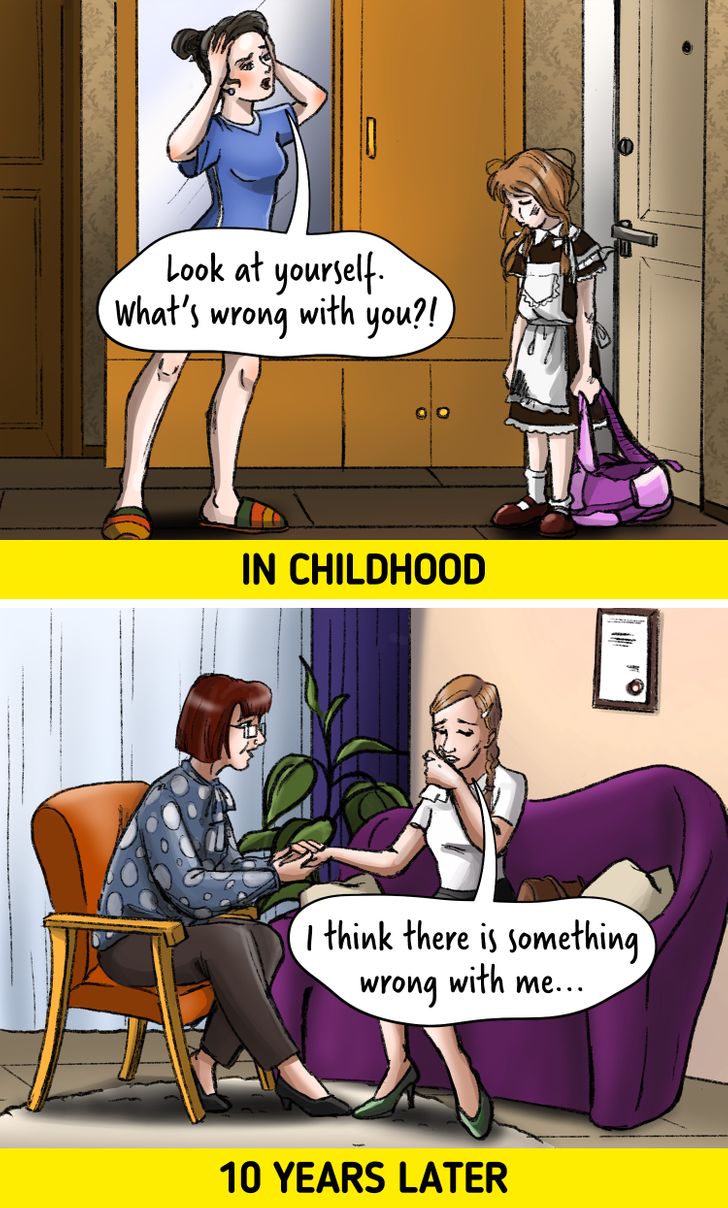
If an adult who the child trusts says that something is wrong with them, you can be sure that they will certainly remember it and believe it. But the main danger of this phrase is that it’s pretty broad. Meaning that the child will subsequently ask themselves this question, but won’t be able to find the answer. Or they can interpret it in their own way, jumping to the conclusion that, “I am a bad person.” As a result, they may need many years of therapy to finally overcome this insecurity.
“I hate my job.”
Everyone has a bad day at work. If this happens, we may often come home and complain, for example, to our partner, about how we hate our job. It may seem that there is nothing wrong with this scenario. However, children absorb everything like a sponge. In fact, studies have found that our attitudes about life have a big influence on determining our children’s success.
Therefore, complaining about work in front of children can make them believe that work is a terrible activity that ruins your life. Eventually, they will either grow up believing that adulthood is a complete nightmare, or they won’t be able to choose a profession at all due to their fears.
What other phrases affect children’s psyches in a bad way, in your opinion? Tell us in the comments below.
Comments
I hate what parents say some times :( it affected me... people should all stop drinking.
Related Reads
12 Comics That Show How Fulfilling and Hard It Can Be to Raise a Teenager
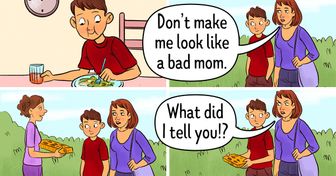
11 Rules Our Parents Followed That May Puzzle Us Today

10 Tricks to Protect Yourself From Pickpockets

15 Real-Life Stories With Hard-to-Believe Plot Twists

An Artist Shows What Disney Princesses Would Look Like in the Modern World, and Cinderella Is So Gorgeous

I Ran Away From Our Family Vacation After My Son Gave Me an Insulting Ultimatum
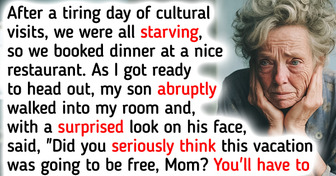
19 Truthful Comics About How Differently Moms and Dads Raise Their Children
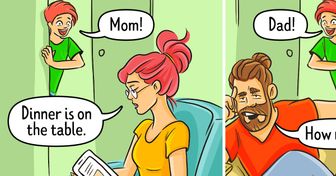
7 Signs You’re a Good Parent, Even If You Are Not So Sure
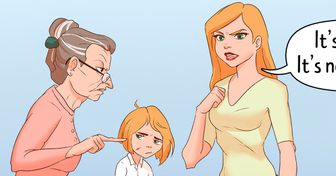
An Artist Draws Cartoon Characters as People, and the Results Are Incredibly Real

15 Stories That Prove Some Memories Are Impossible to Delete
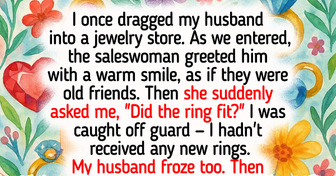
I Refused to Be the Fall Guy After My Boss Called Me "Useless"—I Had Him Reassigned and Took His Clients
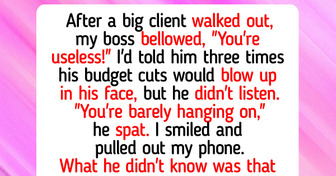
18 Stories That Prove Living in an Apartment Is Like Having a Front-Row Seat to a Comedy Show
